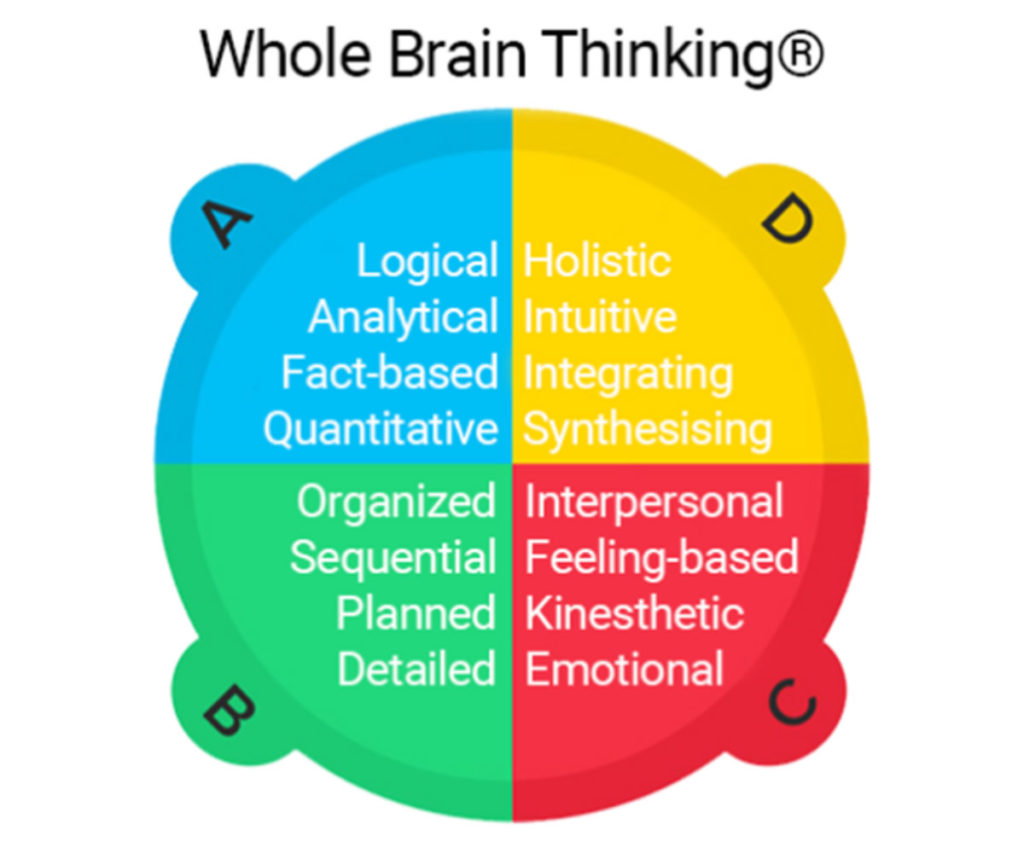Maybe it's human nature, maybe it's the conditioning of social media, but our current proclivity to hire "beautiful" people rather than choosing engaged and aspiring team members is neither rational nor justifiable.
Perhaps it's a product of over-reliance on textbook approaches or even just old fashioned biases, but employers who focus on GPA's and a resume are often not giving our grads a fair go.
For HR peeps, who seem well-versed at summarising what the next new recruit needs to look like (on paper, and in person) there's a much bigger – and more colourful picture – that is hugely more worthwhile looking at: The colour of your brain.
And I'm not talking about the pinkish-grey mass of worm-like tissue that we envisage is the core operating centre of our being, but the primary-coloured quadrants of preferential whole-brain thinking first put to us by Ned Herrmann in the 1980's.
I'd argue that this pioneer got it right way back then, even before we had the luxury of Instagram influencers asserting their views into our handheld news feeds: the way people think can have a huge impact to critical business areas like sales, leadership, team work and productivity.

You can look up the HBDI, or Herrmann Brain Dominance Instrument* if you aren't already aware of what colour you think in, but I'll attempt to explain my own dumbed down (more for myself rather than anyone else) version for you here:
- Blue Brainers are logical fact-based thinkers, more inclined to say No than Yes;
- Green Brainers like processes and plans and love to see the devil in the detail;
- Red Brainers are the touchy-feely types and great with people;
- While the Yellow Brainers tend to be blue-sky creative thinkers who like saying Yes more than No.

Just like any good office colour scheme, where you don't want to be too heavy on the blue tones and skimpy on the warmer ones – it's the same for your team. Each different type of thinker brings a certain band to the rainbow that will ultimately set your team up as a whole-brained, well-rounded blockbuster hit success machine.
The sooner that professional services firms recalibrate their hiring policies and adjust their bi-focals to look past the glossy marketing collateral of the universities and social media profile pics and consider the merits to the different coloured brains there are out there, the better off we will be.
When we manage to keep our personal biases in check and be understanding and objective about the shiny new graduates' resumes, the sooner the hardworking alumni of our universities and colleges will get a fair go and businesses will flourish.
For decades now, we've been assured by management consultants, academics and tertiary institutions that firms need the brightest and smartest graduates that they can get their hands on. After all, our clients want to know that they've got nothing other than genii working on their complex matters, right? And a degree holder with a GPA of 5.5 couldn't possibly deliver the same or better outcome than a grad with a GPA of 6.7, right? Nor could a graduate from a regional university possibly be better for our hallowed firm than one from that sandstone and ivy university that the firm's managing partner's grandfather won the university medal at in the 1930's? What nonsense!
More importantly, we should worry about hiring the wrong person (and not just because of the cost of staff turnover) because we all know that one bad apple can spoil the barrel!
What use is it having a graduate who starred with a GPA of 6.5 from a prestigious university if they have narcissistic personality traits and a tendency to recite a repertoire of conspiracy theories?
And why hire the applicant with the highly polished resume who arrived at the interview groomed, plucked, plumped and styled to within an inch of their lives if they have all the emotional intelligence of a cornflake? For me, every hire has to be about alignment to values. A recruitment process has to be as much about the applicant choosing the organisation as it is about the firm engaging new talent.
Asking a few questions of potential new recruits that aim to unravel their predominant (coloured) thinking patterns could be a few minutes well spent. It's kind of like the new emphasis some recruiters are pinning on our EQ as opposed to just our IQ – which, don't get me wrong, is a good move but can have a tendency to frighten executive-types with the word 'emotional'.
Many years ago I began shortlisting resumes based on the personality that emanated from the page, rather than the university results or applicant's personal achievements. Sure, there has to be a threshold for results and academic ability, but I'd rather have grads with a GPA of 4.5 on my team if they are energetic team players who are motivated to learn, to hone their skills and commit to the values of the organization. And all the more so if they are also well organised, proficient communicators who show empathy, are demonstrably well organised and have a preference to work as part of a team. After all, there can be many reasons why some grads under-achieve their potential at university and similarly, many reasons why some high achieving academics should never be let loose in their profession on the unsuspecting public!
So before employers confine the CV's of "pass mark" applicants to the receptacle next to their left foot, we should remind ourselves of our organisation's values and culture and ask whether this person would be a good fit.
I'm sure we've all seen the cultural damage that can be inflicted by just one internal terrorist and management has rued the expense to the business both through productivity loss and the cost of talent churn.
For me, it has to be attitude ahead of aptitude and fit before function.
And just maybe, one other question: do we need another Blue Brainer?
The content of this article is intended to provide a general guide to the subject matter. Specialist advice should be sought about your specific circumstances.

